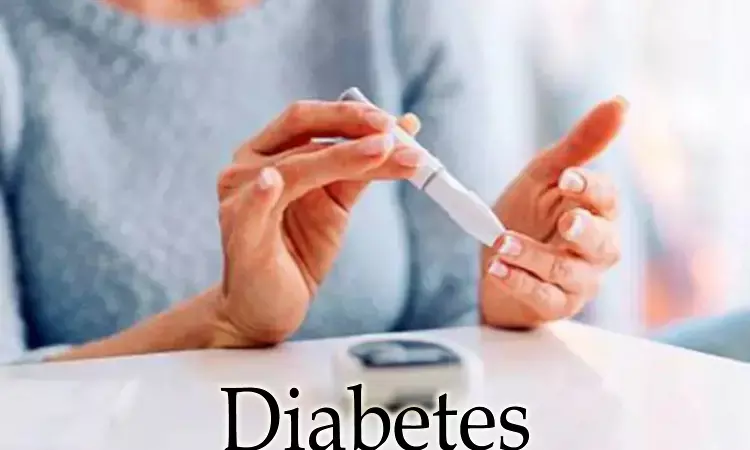- Home
- Medical news & Guidelines
- Anesthesiology
- Cardiology and CTVS
- Critical Care
- Dentistry
- Dermatology
- Diabetes and Endocrinology
- ENT
- Gastroenterology
- Medicine
- Nephrology
- Neurology
- Obstretics-Gynaecology
- Oncology
- Ophthalmology
- Orthopaedics
- Pediatrics-Neonatology
- Psychiatry
- Pulmonology
- Radiology
- Surgery
- Urology
- Laboratory Medicine
- Diet
- Nursing
- Paramedical
- Physiotherapy
- Health news
- Fact Check
- Bone Health Fact Check
- Brain Health Fact Check
- Cancer Related Fact Check
- Child Care Fact Check
- Dental and oral health fact check
- Diabetes and metabolic health fact check
- Diet and Nutrition Fact Check
- Eye and ENT Care Fact Check
- Fitness fact check
- Gut health fact check
- Heart health fact check
- Kidney health fact check
- Medical education fact check
- Men's health fact check
- Respiratory fact check
- Skin and hair care fact check
- Vaccine and Immunization fact check
- Women's health fact check
- AYUSH
- State News
- Andaman and Nicobar Islands
- Andhra Pradesh
- Arunachal Pradesh
- Assam
- Bihar
- Chandigarh
- Chattisgarh
- Dadra and Nagar Haveli
- Daman and Diu
- Delhi
- Goa
- Gujarat
- Haryana
- Himachal Pradesh
- Jammu & Kashmir
- Jharkhand
- Karnataka
- Kerala
- Ladakh
- Lakshadweep
- Madhya Pradesh
- Maharashtra
- Manipur
- Meghalaya
- Mizoram
- Nagaland
- Odisha
- Puducherry
- Punjab
- Rajasthan
- Sikkim
- Tamil Nadu
- Telangana
- Tripura
- Uttar Pradesh
- Uttrakhand
- West Bengal
- Medical Education
- Industry
Higher risk of Cardiovascular Disease in Women With Type 2 Diabetes; claims study

A recent study suggests that women with diabetes, but not those with predibetes, have higher RR for prevalent and incident major adverse outcomes than men. The findings have been published in Diabetes Care.
Cardiovascular disease (CVD) is the leading cause of morbidity and mortality in patients with type 2 diabetes, and it is estimated that cardiovascular risk in patients with diabetes is twofold higher than in those without the disease.
Some hypotheses have been proposed to explain why diabetes abrogates sex differences and aggravates cardiometabolic risk in women as compared with men. These include the reduction in estrogens levels in postmenopausal women and greater accumulation of fat in visceral and ectopic tissues during glucose tolerance deterioration due to the exhaustion of the woman's capacity to store fat in the subcutaneous compartment, thus reaching the same visceral fat deposition required in men to become insulin resistant and to develop diabetes . Another possible explanation may be that women with diabetes receive less cardiovascular risk–modifying therapies compared with their male counterparts.
A great degree of uncertainty exists on whether the risk for CVD is higher in women with prediabetes as compared with men. Results from prior investigations have been inconsistent.
The main purpose of the current study was to evaluate whether prediabetes or diabetes status may interfere with the cardioprotective effects of female sex.
This study cohort comprised 3,540 Caucasian subjects aged .40 years, participating in the CATAMERI study, an observational cohort study of subjects having one or more cardiovascular risk factors, including overweight/obesity, elevated blood pressure, dyslipidemia, and dysglycemia. At baseline, a 75-g OGTT was performed in individuals with FPG ,126 mg/dL and no history of diabetes. The incidence of major adverse clinical events, including the first occurrence of CHD (myocardial infarction and percutaneous or surgical coronary revascularization procedures) and cerebrovascular disease (ischemic stroke or recurrent transient ischemic attacks) was assessed by a detailed medical history obtained from the hospital medical record. Plasma glucose, total and HDL cholesterol, and triglycerides were assayed using enzymatic methods.
On data analysis, the following facts emerged.
- Women with prediabetes and diabetes exhibited greater relative differences in BMI, waist circumference, blood pressure, total, LDL and HDL cholesterol, triglycerides, fasting glucose, hs-CRP, and white blood cell count than men with prediabetes and diabetes when compared with their NGT counterparts.
- Researchers found a higher RR for prevalent CVD in women with diabetes (RR 9.29; 95% CI 4.73–18.25; P<0.0001) than in men (RR 4.56; 95% CI 3.07–6.77; P >< 0.0001), but no difference in RR for CVD was observed comparing women and men with prediabetes.
- In the longitudinal study, we found that women with diabetes, but not those with prediabetes, have higher RR (RR 5.25; 95% CI 3.22–8.56; P < 0.0001) of incident major adverse outcomes than their male counterparts (RR 2.72; 95% CI 1.81–4.08; P < 0.0001).
"the current study suggests that women who have diabetes, but not those who do not, have higher RR for prevalent and incident major adverse events than men."concluded the team.
For full article follow the link: https://doi.org/10.2337/dc20-1401
Primary source: Diabetes Care
Dr Satabdi Saha (BDS, MDS) is a practicing pediatric dentist with a keen interest in new medical researches and updates. She has completed her BDS from North Bengal Dental College ,Darjeeling. Then she went on to secure an ALL INDIA NEET PG rank and completed her MDS from the first dental college in the country – Dr R. Ahmed Dental College and Hospital. She is currently attached to The Marwari Relief Society Hospital as a consultant along with private practice of 2 years. She has published scientific papers in national and international journals. Her strong passion of sharing knowledge with the medical fraternity has motivated her to be a part of Medical Dialogues.
Dr Kamal Kant Kohli-MBBS, DTCD- a chest specialist with more than 30 years of practice and a flair for writing clinical articles, Dr Kamal Kant Kohli joined Medical Dialogues as a Chief Editor of Medical News. Besides writing articles, as an editor, he proofreads and verifies all the medical content published on Medical Dialogues including those coming from journals, studies,medical conferences,guidelines etc. Email: drkohli@medicaldialogues.in. Contact no. 011-43720751


